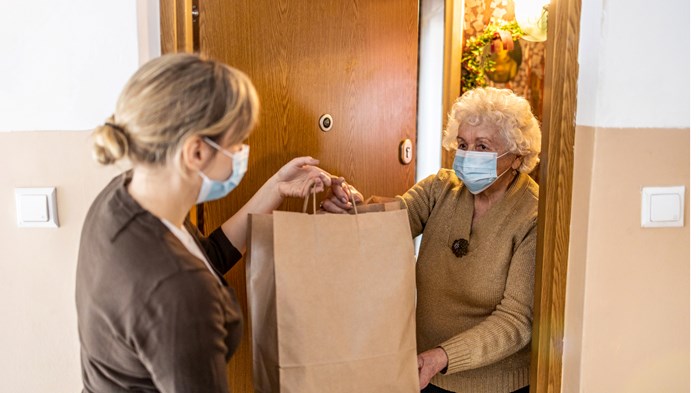Consider the Least of These: Sternberg’s Three Principles of Love and COVID-19

Events such as pandemics are major psychological stressors that are often not equally distributed, especially with the most vulnerable amongst us being disproportionately affected. There is a need to show compassion to those amongst us who experience unspeakable suffering during times of loss.
The COVID-19 pandemic has had a negative impact on families and societies. Poor vulnerable communities around the world with magnified vulnerabilities such as under-resourced health systems, housing problems, extreme poverty and high rates of unemployment have been severely affected by the impact of the ongoing pandemic. Most refugees and migrants were separated from their loved ones due to travel and lockdown restrictions, and some of them were not able to access the host country’s government financial support packages which, in most cases, are only available for citizens. Not to mention those amongst us living with chronic illness and are at high risk due to immune disorders.
There is evidence to suggest that the pandemic and associated lockdowns have disproportionately affected the most vulnerable amongst us, who are more susceptible to poorer mental health, loneliness, and heightened levels of suffering. The loss of resources among these vulnerable people is the primary operating mechanism driving the stress reactions and suffering that arise in such circumstances. The resources can be economic (e.g., jobs, financial security), physical (e.g., access to healthcare and exercise), interpersonal (e.g., intimate and social relationships), and psychological (e.g., a sense of control over one’s life and a sense of purpose).
Compared to those in wealthier and more affluent areas, vulnerable people in low-income and under-resourced communities not only entered the pandemic with fewer resources (e.g., employment, social security, quality healthcare, and housing) but also lost a greater proportion of the resources they had due to more stringent lockdowns and greater job losses.
Love your neighbor as yourself
How can we respond to these vulnerable communities and people in those contexts experiencing loss and suffering? How can we help them safeguard against the conditions that made them susceptible to loss in the first place?
The satisfying answer to these two questions can be found in the second greatest commandment to “Love your neighbor as yourself”. This commandment was first seen in Leviticus 19:18 and then used by Jesus in the Synoptic accounts of Mathew (22:39), Mark (12:31), and Luke (10:27). We also see Apostle Paul using the same words in his epistles (e.g., Gal 5:14; Romans 13:9). The instruction to love our neighbor has a broader implication for Christians, as we reflect on how to respond to our neighbors in a time of loss and suffering.
As the world begins to recover from the pandemic, there is a Christian, moral, political and economic imperative to love our neighbors. A Christ-centered response to COVID-related loss would be one that is rooted in the teachings of Christ to love our neighbor.
The Samaritan and Sternberg’s Love Triangle
According to psychologist Robert J. Sternberg, love is about intimacy, passion, and commitment. Intimacy is the feeling of closeness to our neighbors and aims to strengthen the bond we share with them. Yet, the parable teaches us that the Good Samaritan showed a better intimacy. He makes a neighbor out of a stranger, rather than the regular neighbor that the Priest and the Levi are willing to help. The better Samaritan would seek redemptive intimacy with people of differing economic, racial, and religious backgrounds.
Yet such intimacy is impossible without a Christ kind-of-like passion. Passion, ordinarily, is a strong feeling of enthusiasm or excitement for a cause or a neighbor. But Christ’s passion is exemplified in His intimacy with our strange human nature, such that “we do not have a High Priest who cannot be touched by the feelings of our infirmities” (Heb. 4:15). A better Samaritan’s passion is directed in a significant measure towards those who don’t look or live like them – for God commends His love towards us in that when we were yet sinners, Christ died for us (Roman 5:8).
Commitment, on the other hand, involves a conscious decision to stick with one another, irrespective of the situation. Love, then, is a commitment to building intentional relationships with others, an excitement about the welfare of others, and a promise to protect and stand by one another. The Better Samaritan exemplified this, when he took the robbed and wounded man off the roadside, found a suitable clinic and caregiver for him, paid his bills, and promised to return to check on Him. That’s commitment!
Sternberg’s three principles of love are essential to understanding how we can effectively respond to our neighbors in a time of loss and suffering.
Building meaningful relationships
Love has to start with intimacy. This implies the ability to genuinely reach out to the vulnerable amongst us who are suffering due to the compounded effect of loss of resources to covid. Intimacy in the context of Christian relations can be expressed through social support - a psychosocial resource that is accessed in the context of interpersonal relationships and within one’s social network. Research generally shows that social support reduces negative emotions in times of adversity, promotes wellbeing, and influences the neural regulation of stress responses during difficult conditions. Churches have an opportunity to build meaningful intimate communities that help facilitate a process of recovery. The goal here would be to understand how the pandemic has impacted those that may have been overlooked due to their socioeconomic and health inequalities. Such a support system can help the most vulnerable amongst us to cope with pandemic-related stressors. Though it is not immediately clear how social support influences wellbeing, the most likely explanation would be that it keeps people’s reactivity to stress relatively low through a positive appraisal of the potential stressors in the context of close relationships.
Expressing enthusiasm
Beyond building intimate communities of faith there is a moral imperative to be passionate about the cause of loving our neighbors. It is not enough to identify with the suffering of others without being a part of their journey toward wholeness. What good is a relationship if it lacks depth? A superficial relationship is one that is only on the surface, often because of the need to please others. This is not love. It is false pretense. It is pride looking for glory by masking as love. In the words of Apostle Paul, “Love suffers long and is kind; love does not envy; love does not parade itself, is not puffed up; does not behave rudely, does not seek its own, is not provoked, thinks no evil; does not rejoice in iniquity, but rejoices in the truth” (1 Corinthians 13:4-6). The excitement that comes from loving one another, especially the most vulnerable amongst us, comes with an enduring passion of long suffering for the sake of seeing others thrive and flourish. Our job is not yet done until we see the most vulnerable succeed and regain the resources lost to covid.
Unflinching commitment to love
In order to hang on to that binary thread of hope and enthusiasm for the sake of a neighbor’s welfare, we need commitment to the cause of love. The commitment process in loving our neighbor can help support the psychological recovery of those who have experienced great suffering due to covid, as they build the spiritual resilience and fortitude to withstand the wiles of loss.
Most importantly, such commitment must see them through to becoming better followers of Jesus through an intentional discipleship process that seeks to love people with purpose and lead them into a deeper relationship with Christ.
Love is the nature of God's outflowing affection. It is an invitation to develop a genuine, meaningful relationship with the most vulnerable amongst us. It is the genuine enthusiasm to love our regular and remote neighbors in times of suffering and loss as Christ would, and a commitment to see the weak amongst us stand strong. If Christ were to walk the earth today, I am sure that his response to Covid would be to love the most vulnerable, and so should you.
Victor Counted, PhD., is an interdisciplinary psychological scientist and incoming associate professor in the School of Psychology and Counselling at Regent University. He is also a faculty affiliate of the Human Flourishing Program at Harvard University and fellow of Western Sydney University’s School of Psychology. His work examines how various aspects of psychosocial and psychospiritual resources shape health and well-being across cultures. He can be found online at www.vcounted.com or on Facebook and Twitter @VCounted.
The Better Samaritan is a part of CT's
Blog Forum. Support the work of CT.
Subscribe and get one year free.
The views of the blogger do not necessarily reflect those of Christianity Today.





















